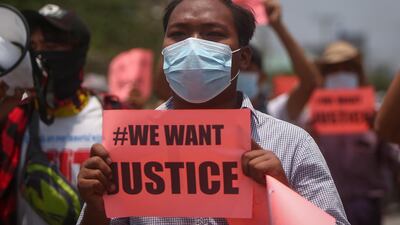More than 200 campaign groups have called for an arms embargo to be slapped on Myanmar to deny weapons to the junta that staged a coup in February and is brutally cracking down on pro-democracy activists.
Human Rights Watch, Amnesty International and 202 other groups on Wednesday urged the UN Security Council to pass a resolution imposing the arms embargo and threatening sanctions on Myanmar in an effort to reverse the February 1 putsch.
The move comes amid concerns that several rounds of UN talks and last month’s special Association of Southeast Asian Nations leaders’ conference have done little to reverse junta leader Min Aung Hlaing’s power grab.
“Mere condemnation by the international community has had no effect,” said Lawrence Moss of Amnesty International.
“It is time for the UN Security Council to use its unique powers to impose a comprehensive global arms embargo in order to try to end the military’s killing spree.”
More than 769 civilians have been killed in the military's crackdown on pro-democracy protests since it ousted an elected government led by Nobel laureate Aung San Suu Kyi on February 1, claiming fraud in last year's election.
The 15-nation UN council has condemned the violence against demonstrators, but has not called the military takeover a coup or threatened any reprisals due to opposition from veto-wielding members China and Russia and others.
“The council’s occasional statements of concern in the face of the military’s violent repression of largely peaceful protesters is the diplomatic equivalent of shrugging their shoulders and walking away,” said Louis Charbonneau, a Human Rights Watch campaign director.
Myanmar's national unity government, which was set up by opponents of army rule, said on Wednesday it had formed a "people's defence force" to protect its supporters from military attacks and violence at the hands of the junta.
The move was a precursor to establishing a Federal Union Army in an effort to end the “70-year long civil war” in Myanmar, read a statement from the shadow government, which includes ousted politicians and members of ethnic minority groups.
Myanmar's UN ambassador, Kyaw Moe Tun, who has denounced the coup and rejected the junta's claims that he no longer represents the country, on Tuesday urged the US to take the lead in reversing the putsch.
He told Congress that the US should help to end the “murderous military regime” through sanctions, an arms embargo, a no-fly zone and by backing the newly formed government of national unity.
The military showed no signs of backing down this week, with the junta-run media on Tuesday announcing a ban on satellite television receivers, saying outside broadcasts threatened national security.
With mobile internet access largely cut off in a bid to quell pro-democracy protests, Myanmar has increasingly looked headed to return to the state of isolation that preceded a decade of democratic reforms.
The junta said it was forced to seize power because its complaints of fraud in a November election won by Ms Suu Kyi's party were not being addressed by an election commission.
Ms Suu Kyi, 75, has been detained since the coup along with many other members of her party. Activists say more than 3,600 people are currently in detention for opposing the military.


